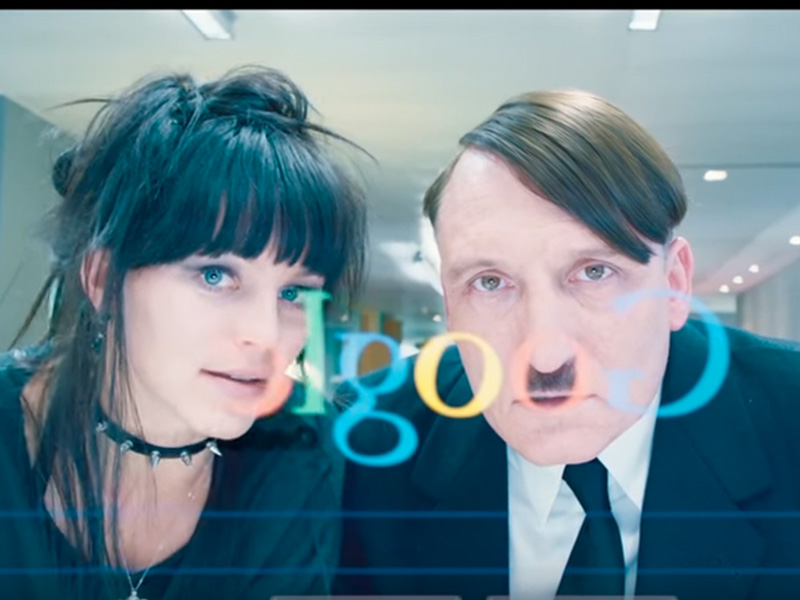The most popular movie in Germany, Er ist wieder da (Look Who’s Back), based on Timur Verme’s bestselling 2012 novel of the same name, is a Borat-style mockumentary that envisions how German society circa 2015 would react to the return of Nazi dictator Adolf Hitler, played by actor Oliver Masucci.
The term ‘Borat-style’ is used here because, like Sacha Baron Cohen’s uncomfortable masterpiece, it is shot with both actors and bystanders (reportedly) that interact with the freshly-resurrected Hitler, some of whom are Neo-Nazis thrilled to share the screen with the Nazi dictator, and many who are “normal, middle-class people” that are worryingly susceptible to Hitler’s charms.

Also, like Borat, the film, despite its controversial nature, is a comedy. In fact, it’s been the No. 1 movie in Germany for weeks, according to reports.
The movie begins with Hitler magically awakening after 70 years since his demise in 1945, in East Berlin near the bunker where he and Eva Braun committed suicide. Hitler eventually meets with a TV producer, and after going on a racist rant, becomes a YouTube sensation. Naturally, Hitler is given his own show.
The film’s fictional aspects are what provide the hilarity, focusing on Hitler’s relationship to the modern world, and his attempts to understand Wikipedia (which he believes has Aryan origins due to its resemblance to Wikinger), the Internet, and how Germany lost to the allied forces in World War II.
“I’m glad Goebbels never saw this,” he says after finding that German television is chock full of cooking shows and reality television.
It’s the Führer’s interactions with real people that are slightly disturbing. The film’s tagline boasts that when Hitler meets with people on the streets, they’re not actors. Many of the people laugh as they pose for selfies with him, and even perform a few Nazi salutes.
According to the Independent, out of 300 hours of filming, there were only two negative responses to Hitler, one of which made the movie. “In the year 2014, if someone comes to the central square in Bayreuth pretending to be Hitler and if that is tolerated by the general public, then I have to say: that is bad for Germany,” one man said. “And if it were up to me, I would have chased you off.”
Then, there’s some bystanders who subtly agree with polices the real Hitler advocated for. One woman says “foreigners” are the main cause of Germany’s problems, while the other says African immigrants are lowering the German IQ. “We Germans are not allowed to open our mouths because we still have that stigma,” one man said. In one scene, a group of soccer fans are persuaded by Hitler to attack an actor for making anti-German comments, which they do. “They would really have completely have beaten him up if we hadn’t stopped him,” director David Wnendt told the Independent. “It was so easy to get them to do that.”
“These extreme opinions are not coming from the fringes, but from the center,” Wnendt said. “Not neo-Nazis, but normal middle-class people.”
The director claimed that the film doesn’t take “Hitler too seriously” and aims to start a dialogue about Hitler’s influence on modern-day Germans. “People leave the cinema discussing the subject,” he said. “They’re asking, ‘Is it really that bad in Germany? Would Hitler really have a chance again nowadays?’”
In a film review by the Forward, Gavriel Rosenfeld writes,
“Ever since the films of Charlie Chaplin, Ernst Lubitsch and Mel Brooks, Anglo-American audiences have laughed at Hitler. But only in the past decade have Germans begun to do so. Films such as Dani Levy’s ‘My Führer’ and comic books such as Walter Moers’s ‘Adolf the Nazi Pig’ testify to a growing German desire to become as ‘normal’ as their Anglo-American neighbours and laugh at the Führer. ‘Er Ist Wieder Da’ shows the dangers inherent in this desire, but the book’s best-seller status speaks to its ongoing appeal.”
Backing Rosenfeld’s claims, since opening last month in Germany, Look Who’s Back has done tremendously well, with over a million admissions in its first two weeks, and raking in over US$10 million. It’s even been picked up for global distribution.
